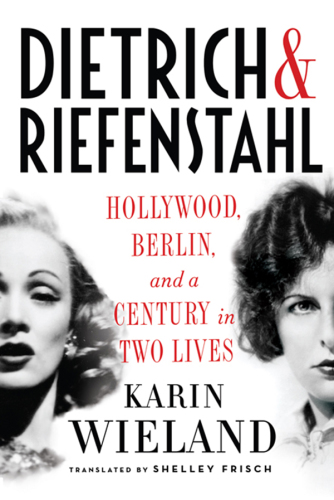
Dietrich & Riefenstahl
Hollywood, Berlin, and a Century in Two Lives
کتاب های مرتبط
- اطلاعات
- نقد و بررسی
- دیدگاه کاربران
نقد و بررسی

July 27, 2015
The ways that two German screen luminaries embodied the growing status and ambitions of 20th-century women are chronicled in this absorbing dual biography by historian Weiland. Born a year apart, movie star Marlene Dietrich and director Leni Riefenstahl both got their start in Weimar Germany’s film industry—Riefenstahl tried out for the iconic show-girl part in The Blue, which eventually went to Dietrich—and became exemplars of the on-the-make new woman of the Jazz Age. Moving to Hollywood, the glamorous Dietrich specialized in playing jaded man-eaters with secret hearts of gold—a heart she displayed in real life by selling American war bonds and touring with the USO. Riefenstahl, upholder of wholesome Aryan virtue in Triumph of the Will and other Nazi propaganda movies, proved far more corrupt, furthering her own career by employing her skills to celebrate Hitler’s regime. (She blithely used concentration camp inmates as extras.) Weiland highlights the entertaining soap opera in their stories, especially the parade of Dietrich’s affairs with men and women—often abetted by her complaisant husband—which involved endless psychodrama and scenes. But she pairs the humor with incisive cultural analysis of the women’s impact as proto-feminists who used sex appeal, savvy, and considerable talent to pioneer new roles for women. Photos.

September 1, 2015
Separating fiction from the apocryphal, German political theory historian Wieland takes readers on a densely layered, whirlwind tour of Weimar Germany, 1930s Hollywood, the Third Reich, World War II, and more. She alternates distinct biographies of the most famous German woman of the 20th century, actress Marlene Dietrich (1901-92), and perhaps the most infamous filmmaker of all time, Leni Riefenstahl (1902-2003). In effect, there's an implied comparison and contrast. Dietrich comes off as more objective, and less lurid, than the 1993 deconstructionist Marlene Dietrich by the star's daughter. The author matter-of-factly delves into the actress's love life (with men and women), focusing on her significant relationships, and unlike many biographers, accentuates Dietrich's warfront service. Conversely, Wieland dismantles Riefenstahl's lifelong protests of political naivete, depicting her as a delusional, shockingly egotistical figure who was concerned only for her career and who savored her insider status with patron and protector Adolf Hitler. (Much of Wieland's ammunition comes from Joseph Goebbels's diaries.) Additionally, the author's concise descriptions convey the visual impact of Riefenstahl's overtly political propaganda films. VERDICT An absorbing read and a must-have for film collections. Highly recommended where Erik Larson's In the Garden of Beasts is popular. [See Prepub Alert, 4/20/15.]--Kent Turner, School Library Journal
Copyright 2015 Library Journal, LLC Used with permission.

























دیدگاه کاربران